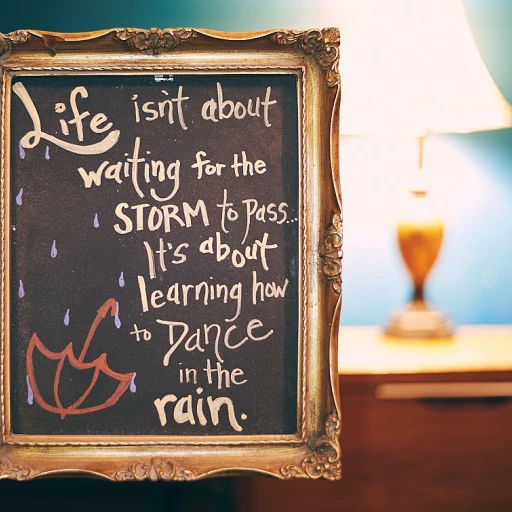
Understanding Vicarious Learning
Vicarious learning, also known as observational learning, is an intrinsic part of our behavioral development, influencing both children and adults alike. This learning theory, introduced by renowned psychologist Albert Bandura, emphasizes the significance of observing others to acquire new knowledge and skills. Unlike direct learning, where individuals gain understanding through firsthand experience, vicarious learning allows people to learn vicariously by watching other people's behaviors and the consequences that follow.
Observational learning is an essential component of social learning. It highlights how individuals model behaviors by watching role models in various settings. For example, a child observing a parent or teacher can begin to adopt similar behaviors and attitudes. Similarly, adults in professional environments learn effective skills or strategies by observing their peers and mentors. This process can effectively reduce anxiety associated with learning new tasks, as individuals may feel less pressured when learning indirectly.
The Importance of Social and Emotional Learning
Social and emotional aspects also play a crucial role in the learning process. Emotionally secure environments encourage individuals to grasp complex concepts more effectively through vicarious experiences, as the perceived risk of failure is significantly reduced. Mentorship can further enhance this environment by providing guidance, encouragement, and real-world examples to follow.
This learning development is not only restricted to children but extends to adults who seek to upskill in their careers. Training programs that incorporate observational learning often showcase examples of vicarious success stories, bolstering people's confidence in their ability to learn and apply new knowledge.
Recent meta-analysis studies highlight the advantages of this learning approach in diverse educational settings. Utilizing a blend of observational learning with direct training methods enhances comprehension and retention, thereby bridging the gap between theory and practice.
The Role of Mentorship in Reskilling
The Influence of Experienced Guides
Observational learning plays a pivotal role in the reskilling journey, especially through mentorship. Expert guides and role models can shape learning by demonstrating effective behaviors and skills. This process allows individuals to learn vicariously by observing the actions and decisions of experienced figures.
In the domain of vicarious learning, the impact of social learning cannot be overstated. Mentorship provides a platform where individuals observe and absorb knowledge, honing their development as they watch mentors navigate complex tasks and challenges. By observing these seasoned professionals, learners can achieve breakthroughs in both skills and confidence.
Albert Bandura, a renowned figure in this field, highlighted the significance of social models in learning theory. His insights underline the importance of direct and vicarious experiences in influencing behavior and fostering the acquisition of new skills. The Bandura social learning theory emphasizes that observing and imitating others can significantly minimize learning time and enhance practical skills without direct learning experiences.
Moreover, mentorship aids in overcoming common barriers in the learning process, such as anxiety disorders. By observing a mentor, a learner might mitigate anxiety through solid social emotional connections and well-directed guidance. Observational learning thus becomes a tool for easing apprehensions related to tackling new skills or roles.
In a training program setting, mentors not only serve as role models but also provide essential feedback—drawing from their vast repertoire of knowledge and firsthand experiences. Such interactions help individuals learn behaviors specific to their field, ultimately contributing to career growth.
For individuals seeking a comprehensive understanding of mentorship's role in unlocking potential, exploring motivation-based mentorship techniques can be vital. One can find valuable resources on how to boost skills through effective mentorship strategies, which can be instrumental to enhancing one's professional journey.
Leveraging Technology for Observational Learning
Utilizing Technology for Observational Mastery
The age of technological advancement has ushered in myriad opportunities for reskilling, with observational learning becoming more accessible than ever. Vicarious learning, as part of the broader social learning, leverages the proliferation of digital platforms and tools that facilitate the learning process from a distance. These platforms enable individuals to observe and assimilate knowledge, thereby enhancing their skills through practical exposure. One of the key aspects of this learning strategy is its ability to harness the potential of multimedia resources. Video tutorials, virtual simulations, and webinars serve as vicarious experiences, where learners can model their behavior after those demonstrated by experienced professionals in their fields. This is not unlike the classical theory put forth by Albert Bandura, which emphasizes learning through observation of others in social contexts. The learning experience is further enriched as learners encounter diverse role models and industry leaders who showcase best practices. This approach aids in the development of social and emotional competencies, crucial for personal and professional growth. Furthermore, the opportunity to witness how seasoned practitioners navigate real-world challenges can act as a catalyst for learning development. Despite the advantages, it is important to recognize the limitations inherent in relying solely on observational learning. While it facilitates understanding, reinforcing this knowledge through hands-on application remains crucial. Combining direct learning experiences with observational methods can offer a comprehensive approach to mastering new skills. Steps should be taken to design training programs that balance these varied methods for optimal outcomes. For professionals aiming to reskill effectively, integrating technological tools with direct mentorship, as explored in earlier sections, maximizes the potential benefits of learning by observing. To enrich your career development further, consider engaging with specialized compliance training programs to align your skills with industry standards. For more insights, explore how enhancing your career with specialized training can bolster your skill set and employment prospects here.Case Studies: Success Stories in Reskilling
Inspiring Journeys of Skill Enhancement
Success stories abound when it comes to reskilling through observational learning. One compelling case is of professionals in technology sectors who have transitioned into new roles by leveraging social learning techniques. Observing seasoned mentors in action allows individuals to acquire not just technical skills, but also the soft skills needed to thrive in dynamic environments.
Many individuals report significant growth by learning vicariously—witnessing the process and strategies of others rather than experiencing them directly. This can be particularly beneficial in fields requiring complex problem-solving and swift decision-making. Observational learning theory supports this, suggesting that observing behavior in real-world contexts can enhance the learning process and behavioral adaptation.
In the healthcare industry, professionals have utilized vicarious learning to reinforce procedural knowledge. For instance, observing a skilled surgeon can provide invaluable insights into techniques and approaches that are not easily acquired through traditional learning methods alone. This aligns with the benefits of vicarious experiences highlighted in various studies, including those found on PubMed, contributing to faster and more effective skill acquisition.
In education, teachers have adopted examples of vicarious learning to adapt their teaching methods, fostering an environment where children and adults alike can learn more efficiently. Such practices are often informed by both the bandura social learning theory and ongoing meta analysis of educational strategies, demonstrating both direct and indirect learning advantages.
Through foundational experiences gained in observing, individuals not only build their skills but also gain increased confidence and reduce anxieties related to performance in new roles. These stories are testament to the power of vicarious and observational learning in personal development and professional enrichment, transforming not only skillsets but also career trajectories.
Challenges and Solutions in Vicarious Learning
Overcoming Common Obstacles in Vicarious Learning
In the journey of reskilling through observational learning, several challenges can arise, despite its numerous advantages. A primary concern often encountered is the limitation posed by the lack of direct experience. Observational learning relies heavily on observing and mimicking behaviors or skills from role models, which can sometimes lead to gaps in understanding and practical application. Learners may struggle to apply theoretical knowledge without the hands-on experience often gained through direct participation.
Another challenge involves the accuracy of the observational learning process. The quality of learning can significantly depend on the model being observed. If the model exhibits incorrect behaviors or incomplete processes, these can be transferred to the learner, leading to potential misunderstandings or inefficiencies in skill acquisition. It's crucial that role models demonstrate optimal practices to ensure that the learning process yields beneficial results.
Additionally, research has shown that one’s social environment plays a critical role in vicarious learning. A supportive social context can enhance learning, but a lack of encouragement or negative dynamics may hinder progress. According to Bandura's social learning theory, behavior is heavily influenced by observing others within one's environment. Thus, creating a positive and nurturing learning atmosphere is fundamental for successful skill development.
Moreover, individuals with anxiety disorders may experience heightened challenges in a vicarious learning setting. Social anxiety, for instance, can inhibit one's ability to comfortably engage in observational learning activities, such as participating in group discussions or seeking clarification from role models. Providing a supportive, anxiety-reducing environment with targeted programs can assist in minimizing these barriers.
For children, the learning process via observation is particularly influential, as they often learn vicariously through observing parents, teachers, and peers. Child development experts emphasize the importance of positive role modeling at a young age to foster social emotional skills that pave the way for lifelong learning habits.
Implementing solutions like structured training programs can address these challenges by providing guided opportunities for direct learning alongside observational methods. These programs can help bridge the gap between observing and practicing, ensuring a more comprehensive acquisition of skills.
A meta-analysis of observational learning further supports the need for strategically designed interventions that balance vicarious learning with direct, hands-on experiences, ensuring the learning process is both efficient and effective.
Future Trends in Reskilling Through Observational Learning
Exploring the Impact of Emerging Trends
The evolution of reskilling through vicarious learning is continuously shaped by emerging trends and technological advancements. Observational learning has grown beyond the traditional environments, embracing more dynamic and interconnected methods.
The rise in digital platforms has fostered an environment where individuals can access a rich repository of role models and mentors, facilitating both direct and vicarious learning experiences. Online communities and social learning environments offer valuable opportunities for learners to observe the behaviors and practice demonstrated by others without the anxiety often associated with traditional classroom settings.
Technological advancements are expected to bolster these learning processes further. Virtual reality (VR) and augmented reality (AR) are progressively being integrated into training programs, providing realistic simulations where learners can gain social and emotional skills through interaction and observation. This mirrors the theroetical framework presented by influential figures like Albert Bandura in the field of observational learning. By creating environments where individuals can learn through observing and interacting with digital role models, the potential for skill acquisition has expanded significantly.
Importantly, the implementation of machine learning algorithms, capable of tailoring learning experiences and behaviors to individual needs, can personalize the observational learning process. These technologies not only improve accessibility to knowledge but also enhance the overall development of targeted skills.
However, along with these promising trends come challenges. As emphasized in recent meta-analysis studies, ensuring the efficacy and ethical use of these technologies remains a core concern. Developers and educators must continually assess the impact of such interventions on social and cognitive development, particularly in more vulnerable populations like children.
In summary, the future of reskilling through observational learning is both promising and dynamic. By embracing technological advancements while addressing potential challenges, we can create a learning environment that adapts to the rapidly changing workplace landscape, offering individuals enhanced opportunities for continuous development.













